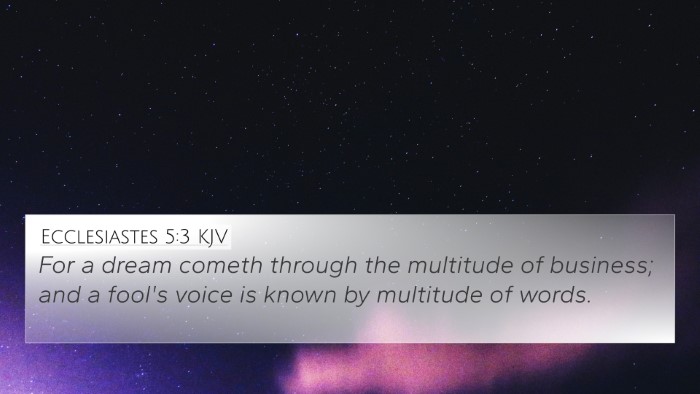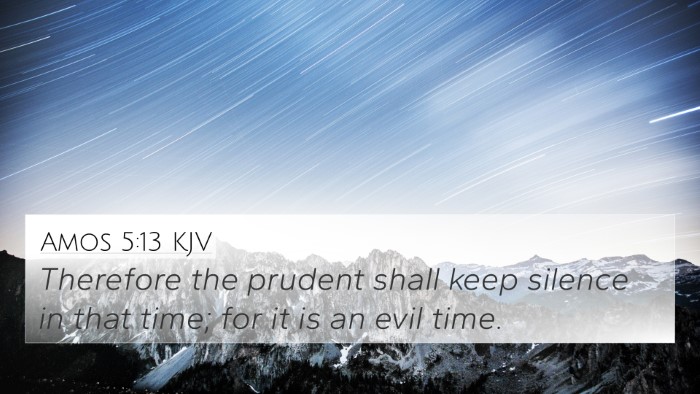Old Testament
Genesis Exodus Leviticus Numbers Deuteronomy Joshua Judges Ruth 1 Samuel 2 Samuel 1 Kings 2 Kings 1 Chronicles 2 Chronicles Ezra Nehemiah Esther Job Psalms Proverbs Ecclesiastes Song of Solomon Isaiah Jeremiah Lamentations Ezekiel Daniel Hosea Joel Amos Obadiah Jonah Micah Nahum Habakkuk Zephaniah Haggai Zechariah MalachiJob 13:5 Similar Verses
Job 13:5 Cross References
O that ye would altogether hold your peace! and it should be your wisdom.
Uncover the Rich Themes and Topics of This Bible Verse
Listed below are the Bible themes associated with Job 13:5. We invite you to explore each theme to gain deeper insights into the Scriptures.
Job 13:5 Cross Reference Verses
This section features a detailed cross-reference designed to enrich your understanding of the Scriptures. Below, you will find carefully selected verses that echo the themes and teachings related to Job 13:5 KJV. Click on any image to explore detailed analyses of related Bible verses and uncover deeper theological insights.

Proverbs 17:28 (KJV) »
Even a fool, when he holdeth his peace, is counted wise: and he that shutteth his lips is esteemed a man of understanding.

James 1:19 (KJV) »
Wherefore, my beloved brethren, let every man be swift to hear, slow to speak, slow to wrath:

Ecclesiastes 5:3 (KJV) »
For a dream cometh through the multitude of business; and a fool's voice is known by multitude of words.

Job 18:2 (KJV) »
How long will it be ere ye make an end of words? mark, and afterwards we will speak.

Job 11:3 (KJV) »
Should thy lies make men hold their peace? and when thou mockest, shall no man make thee ashamed?
Job 13:5 Verse Analysis and Similar Verses
Understanding Job 13:5
Job 13:5 reads:
"Oh that you would altogether hold your peace! And it should be your wisdom."
This verse from the Book of Job reflects a moment of deep struggle and suffering, as Job converses with his friends, who have come to offer their counsel. The meaning of this verse can be explored through the insights of public domain commentaries.
Insights from Commentaries
- Matthew Henry:
Henry emphasizes the importance of silence when one does not truly understand the situation or circumstances at hand. He suggests that Job is expressing frustration with his friends’ premature advice, indicating that sometimes remaining silent is a sign of wisdom. Their words, instead of bringing comfort, are viewed as harmful and unhelpful.
- Albert Barnes:
Barnes notes that Job's friends were quick to speak without proper understanding of his suffering. He points out that the verse conveys Job's desire for them to listen and reflect rather than to rush into judgment. The wisdom of holding one's peace is seen as essential to providing true support in times of suffering.
- Adam Clarke:
Clarke suggests that Job's longing for silence not only signifies a desire for peace but also implies a search for deeper understanding. He interprets Job's words as a call for his friends to consider their words carefully. The verse serves as a reminder of the complex nature of human suffering and the complexities involved in offering counsel.
Thematic Connections and Cross-References
Job 13:5 can be linked thematically to several other Bible verses that speak on themes of wisdom, suffering, and the power of speech. Here are some key cross-references:
- Proverbs 17:28: "Even a fool, when he holdeth his peace, is counted wise." - This verse underscores the value of silence in demonstrating wisdom.
- James 1:19: "Wherefore, my beloved brethren, let every man be swift to hear, slow to speak, slow to wrath." - Reflects the importance of listening over speaking in building understanding.
- Ecclesiastes 3:7: "A time to keep silence, and a time to speak." - Recognizes the appropriateness of silence in various circumstances.
- Psalms 39:2: "I was dumb with silence, I held my peace, even from good; and my sorrow was stirred." - Illustrates a similar sentiment of questioning when to speak and when to remain silent.
- Proverbs 18:13: "He that answereth a matter before he heareth it, it is folly and shame unto him." - Highlights the folly of hasty speech without understanding.
- Job 6:24: "Teach me, and I will hold my tongue: and cause me to understand wherein I have erred." - Job desires enlightenment through silence and reflection.
- Romans 12:15: "Rejoice with them that do rejoice, and weep with them that weep." - Emphasizes empathy and understanding over unchecked advice.
Inter-Biblical Dialogue
The dialogue between Job and his friends can be seen as an illustration of a broader theme in scripture concerning the treatment of those who are suffering. It raises questions of how we communicate with each other during times of distress, echoing sentiments found throughout the Bible.
Conclusion
In conclusion, Job 13:5 challenges readers to ponder the nature of wisdom in our conversations, especially concerning sensitive matters such as suffering. By exploring this verse through relevant cross-references, we align ourselves with the scriptural call to be wise in our speech and considerate in our interactions with those who are in pain.
Further Study
For those interested in exploring more about cross-referencing biblical texts, several tools and methods can assist in a deeper study:
- Utilizing a Bible concordance to identify keywords and themes.
- Engaging in cross-reference Bible study techniques to uncover thematic connections.
- Referring to a Bible cross-reference guide to create a comprehensive study framework.
- Implementing inter-Biblical dialogue methods to enhance understanding of scripture.








